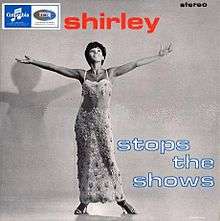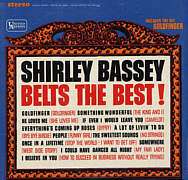Shirley Stops the Shows
| Shirley Stops the Shows | ||||
|---|---|---|---|---|
 | ||||
| Studio album by Shirley Bassey | ||||
| Released | 1965 | |||
| Recorded | 1965 | |||
| Genre | Vocal | |||
| Label | EMI/Columbia | |||
| Producer | Norman Newell | |||
| Shirley Bassey chronology | ||||
| ||||
| Shirley Bassey Belts the Best! | ||||
 US album cover |
||||
Shirley Stops the Shows is the seventh Shirley Bassey studio album, her 5th and final studio album recorded for the EMI/Columbia label in the UK. Released in 1965, this album is a mix of standards and showtunes. Shirley Bassey was at a high point in her career, with worldwide success of her single "Goldfinger", but the album failed to chart in the UK, a first for her Columbia albums.[1] The album met with more success in the US, reaching number 85 in the US Pop charts.[2] For the US market it was issued with an alternative running order, retitled Shirley Bassey Belts the Best! and "The Lady Is a Tramp" was replaced by "Goldfinger". Original release was in mono and stereo, both mono versions feature an alternative studio recording of "People" which has not yet been re-issued on CD. The stereo version, remastered, was issued on CD in 2008 together with 12 of Those Songs by BGO Records.
Track listing
Side One.
- "Everything's Coming up Roses" (Jule Styne, Stephen Sondheim) - 3.22
- "The Sweetest Sounds" (Richard Rodgers) - 2.38
- "He Loves Me" (Jerry Bock, Sheldon Harnick) - 2.04
- "I Believe in You" (Frank Loesser) - 2.13
- "People" (Jule Styne, Bob Merrill) - 2.47
- "The Lady is a Tramp" (Richard Rodgers, Lorenz Hart) - 2.55
Side Two.
- "Once in a Lifetime" (Anthony Newley, Leslie Bricusse) - 2.20
- "Something Wonderful" (Richard Rodgers, Oscar Hammerstein II) - 2.42
- "A Lot of Livin' to Do" (Charles Strouse, Lee Adams) - 1.54
- "If Ever I Would Leave You" (Alan Jay Lerner, Frederick Loewe) - 2.43
- "Somewhere" (Stephen Sondheim, Leonard Bernstein) - 2.49
- "I Could Have Danced All Night" (Lerner, Loewe) - 1.54
Personnel
- Shirley Bassey – vocal
- Johnny Scott and his Orchestra - on track 4 and 10
- Tony Osborne and his Orchestra - on track 11
- Kenny Clayton and his Orchestra - on track 12
- Johnnie Spence and his Orchestra - on tracks all other tracks